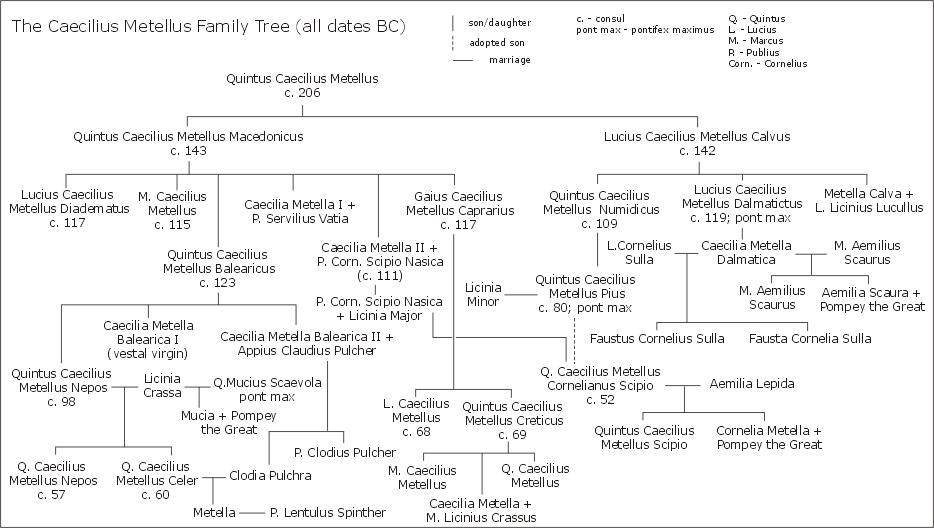Sextus Roscius
Sextus Roscius (often referred to as Sextus Roscius the Younger to differentiate him from his father) was a Roman citizen farmer during the latter days of the Roman Republic. In 80 BC, he was tried in Rome for patricide and was successfully defended by the young Cicero in the extant Pro Roscio Amerino, his first major litigation. The case involved some risk for Cicero, since he accused Lucius Cornelius Chrysogonus, a freedman of Sulla, then dictator of Rome, of corruption and involvement in the crime.
Sheltered by Caecilia
| Wikisource has original text related to this article: |
Before the trial, Roscius was sheltered by Caecilia,[1] who appears to be Caecilia Metella Balearica Major, a former Vestal Virgin by this time (since she had her own house). This Caecilia was a relative of Sulla's wife Caecilia Metella Dalmatica, and had powerful connections among the Roman elite; her intercession for the young Julius Caesar saved his life and political career. In 80 BC, the Metelli were staunchly in Sulla's camp. Her brother was Quintus Caecilius Metellus Nepos, a former consul whose stepdaughter, Mucia Tertia, was now wife of Pompey. Her cousins included Quintus Caecilius Metellus Numidicus Pius, chief ally of Sulla. Her widowed brother-in-law was Appius Claudius Pulcher, who had been Praetor in 88 BC, another ally of Sulla.

Trial
Sextus Roscius was accused of patricide, the killing of one's father, in the death of his father, Sextus Roscius Major.
Cicero was a native to the Italian countryside, and Sextus Roscius was a young country boy who was accused and charged with the death of his father even though he was not in the country at the time of his father's death. As a result of the accusation, Sextus Roscius's properties were taken by the government and sold at an auction. "The prosecution argued that he must have hired someone else to do the deed for him, but neither produced nor named the assassin." [2] In Cicero's first major litigation, he turned the trial around by accusing Sulla of murdering the father for political gains. .[3]
Cicero argued that those who chose to align themselves with Chrysogonus in the belief that they were supporting the nobility were wrong to do so, since his corruption was a stain on the Republic. "For the cause will be rendered more splendid by resisting every worthless man. The worthless favourers of Chrysogonus, who think that his cause and theirs are identical, are injured themselves by separating themselves from such splendor." (Cic. S. Rosc. 142) [4]
References in popular culture
- The trial of Sextus Roscius is depicted in Steven Saylor's first Roma Sub Rosa mystery novel, Roman Blood.
- Colleen McCullough's novel Fortune's Favorites, part of her Masters of Rome series, also dramatizes the trial.
- The trial is dramatized in the BBC documentary series Timewatch in the episode "Murder in Rome" featuring Mark McGann as Sextus Roscius.
- Big Finish Productions adapted the trial of Sextus Roscius in Cicero by David Llewellyn. Sextus Roscius is portrayed by Simon Ludders.[5]
Notes
- ↑ Oration for Sextus Roscius of Ameria "Caecilia, the sister of Nepos, the daughter of Balearicus"
- ↑ https://www.uvm.edu/~bsaylor/latin/RosciusCommIntro.pdf
- ↑ The Romans: From Village to Empire: A History of Rome from Earliest Times to the End of the Western Empire , Second Edition, Oxford University Press
- ↑ "M. Tullius Cicero, For Sextus Roscius of Ameria, section 142". www.perseus.tufts.edu. Retrieved 2015-12-06.
- ↑ https://www.bigfinish.com/releases/v/cicero-1605